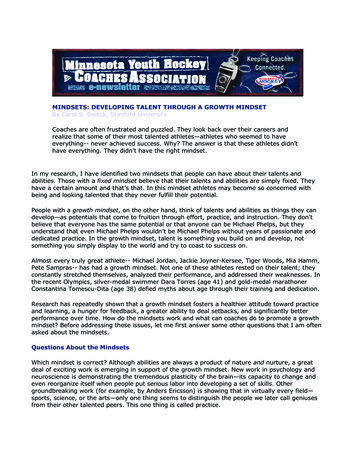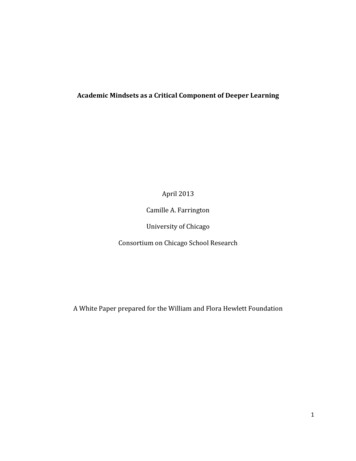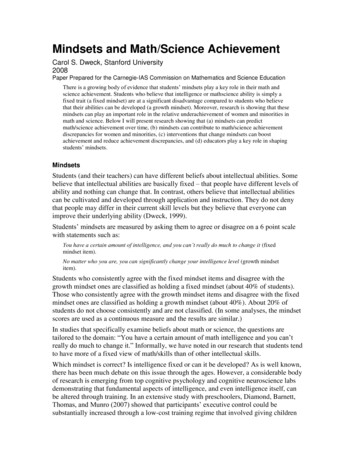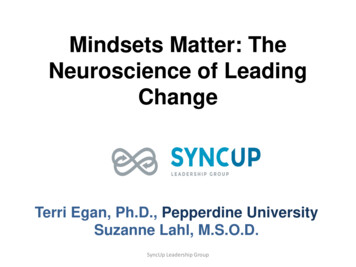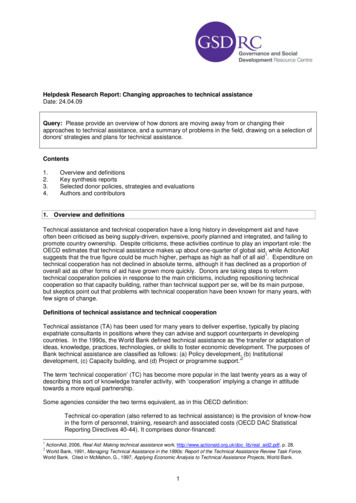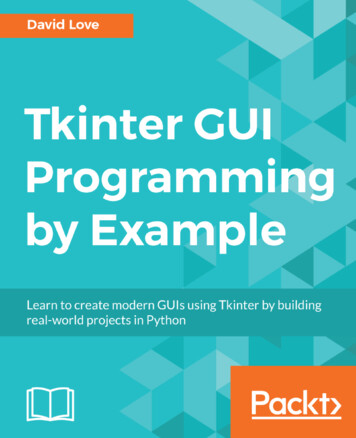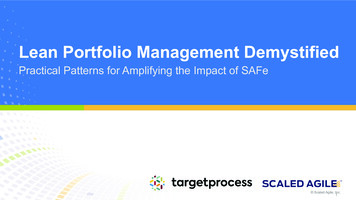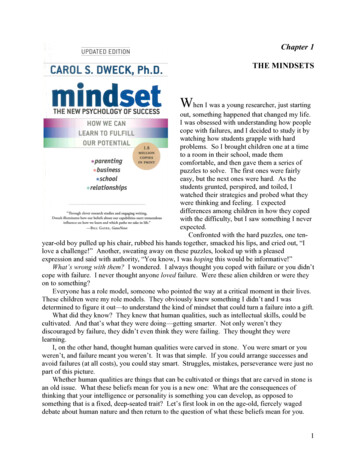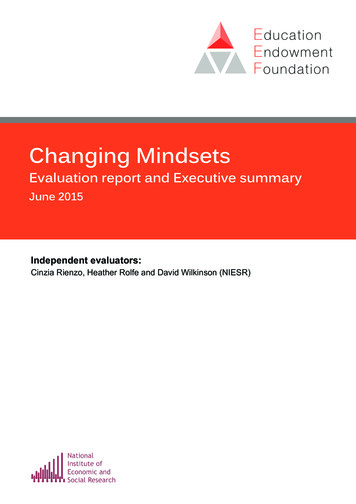
Transcription
E du c ationE n dowmentF ou n dat ionChanging MindsetsEvaluation report and Executive summaryJune 2015Independent evaluators:Cinzia Rienzo, Heather Rolfe and David Wilkinson (NIESR)
The Education Endowment Foundation (EEF)The Education Endowment Foundation (EEF) is an independent grant-making charity dedicated tobreaking the link between family income and educational achievement, ensuring that children from allbackgrounds can fulfil their potential and make the most of their talents.The EEF aims to raise the attainment of children facing disadvantage by: Identifying promising educational innovations that address the needs of disadvantaged childrenin primary and secondary schools in England;Evaluating these innovations to extend and secure the evidence on what works and can bemade to work at scale;Encouraging schools, government, charities, and others to apply evidence and adoptinnovations found to be effective.The EEF was established in 2011 by the Sutton Trust, as lead charity in partnership with Impetus Trust(now part of Impetus – The Private Equity Foundation) and received a founding 125m grant from theDepartment for Education.Together, the EEF and Sutton Trust are the government-designated What Works centre for improvingeducation outcomes for school-aged children.For more information about the EEF or this report please contact:Peter HendersonResearch OfficerEducation Endowment Foundation9th Floor, Millbank Tower21-24 MillbankSW1P 4QPp: 020 7802 1676e: peter.henderson@eefoundation.org.ukw: www.educationendowmentfoundation.org.uk
Changing MindsetsAbout the evaluatorThe trial was independently evaluated by a team from the National Institute of Economic and SocialResearch (NIESR) led by David Wilkinson.Contact details:David WilkinsonNational Institute of Economic and Social Research2 Dean Trench StreetSmith SquareLondon SW1P 3HEp: 020 7654 1917e: d.wilkinson@niesr.ac.ukEducation Endowment Foundation1
Changing MindsetsContentsExecutive summary. 3Introduction . 5Methodology . 8Impact evaluation . 15Process evaluation. 27Conclusion . 34References . 37Appendix 1: Pupil intervention parent letter . 38Appendix 2: Teacher intervention, parent letter . 40Appendix 3: Opt-out form . 42Appendix 4: Full estimation results . 44Appendix 5: Security classification of trial findings . 50Appendix 6: Cost rating . 51Education Endowment Foundation2
Changing MindsetsExecutive summaryThe projectThe Changing Mindsets project sought to improve academic attainment by supporting pupils to developa growth mindset: the belief that intelligence is not a fixed characteristic and can be increased througheffort. Previous research (Good et al., 2003; Blackwell et al., 2007) has suggested that holding thisbelief enables pupils to work harder and achieve better results. The project consisted of two separateinterventions: an intervention that taught pupils directly about the malleability of intelligence through sixworkshops, which were delivered by undergraduates from the University of Portsmouth, andfour further sessions delivered by two local organisations: the Education Business Partnership,and Pompey Study Centre (now called Portsmouth in the Community).a professional development course that trained teachers on approaches to developing andreinforcing growth mindsets through their teaching. This course consisted of two half days ofinstruction.The project targeted Year 5 pupils in Portsmouth, Southampton and Hampshire. The delivery of theinterventions was led by the University of Portsmouth and took place between January and May 2013.Key conclusions1. Pupils who received the growth mindset workshops made an average of two additional months’progress in English and maths. These findings were not statistically significant, which means thatwe cannot be confident that they did not occur by chance. However, the finding for English wasclose to statistical significance, and this suggests evidence of promise.2. Pupils whose teachers received the professional development intervention made no additionalprogress in maths compared to pupils in the control group. These pupils made less progress inEnglish than the control group, but this finding is not statistically significant and we cannot be surethat it did not occur by chance.3. FSM-eligible pupils who were involved in the professional development intervention gained a betterunderstanding of the malleability of intelligence.4. Intervention and control schools were already using some aspects of the growth mindsetsapproach. This may have weakened any impact of the interventions.5. Future trials could examine the impact of a programme that combines the two interventions andruns for a longer period of time.How secure is this finding?Security rating awarded as part ofthe EEF peer review processThe pupil workshop intervention was evaluated using a randomised controlled trial involving six schoolsand 286 pupils. The findings from this evaluation have moderate to low security. Pupils were randomlyallocated to receive either the intervention or to an active control group where they received the sameamount of extra support with study skills, but without the focus on developing a growth mindset. Thiscomparison allows us to isolate the impact of the focus on growth mindsets and conclude that anyimpact was not caused simply by pupils receiving extra time and attention. The security of the trial wasweakened when one of the six recruited schools withdrew from the project as this reduced the numberof pupils in the analysis.The teacher training intervention was evaluated using a randomised controlled trial involving 30 schoolsand 1,505 pupils. The findings from this evaluation have moderate security. Schools were randomlyallocated to receive either the intervention or a ‘business-as-usual’ control group, where teachers didnot receive any extra training as a result of participation in the trial. The security of these findings waslimited by evidence that the intervention and control groups had different numbers of pupils eligible forfree school meals and different average levels of prior attainment. This introduces the risk that anydifference in outcomes between the two groups is caused by the different composition of the groups,Education Endowment Foundation3
Changing Mindsetsnot by the impact of the intervention. The evaluator attempted to control for these differences usingstatistical techniques in the final analysis.There was some evidence from the process evaluation that teachers in the control groups of both trialswere already aware of growth mindsets theory and using it to inform their practice. This previousexposure to the approach may have weakened the relative impact of the intervention.FindingsPupils who received the growth mindset workshops made an average of two additional months’progress in both English and maths compared to those in the control group. These findings were notstatistically significant, which means that we cannot be confident that they did not occur by chance.However, the finding for English was close to statistical significance, and this suggests evidence ofpromise. Pupils whose teachers received the professional development intervention made no additionalprogress in maths compared to pupils in the control group. These pupils made less progress in Englishthan pupils in the control group, but this finding was not statistically significant and we cannot be surethat it did not occur by chance.The evaluation also measured the impact of the interventions on pupils’ theories of intelligence, usingmeasurements created by Dweck (1999). Pupils involved in both interventions achieved higher scoreson these measures than those in the control group, but the security of these findings is low and it ispossible that they occurred by chance. The professional development intervention led to higher scoreson the growth mindset measurements for pupils eligible for FSM and this finding is secure.Previous research from the US has suggested that growth mindset interventions can have a positiveimpact on attainment. Good et al. (2003) found that using university students to teach pupils about themalleability of intelligence led to large improvements in standardised tests.How much does it cost?The estimated cost of implementing the pupil workshops intervention over three years is 397 per pupilper year. The estimated cost of implementing the teacher training intervention over three years is 16per pupil per year ( 678 per school per year). Over the single year of this evaluation the teacher trainingintervention cost 49 per pupil ( 2,035 per school). Teachers required two half days of supply cover toparticipate in the teacher training, which schools might choose to deal with in ways that may or may notincur a financial cost.GroupEffectsizeTeacher training (maths, all pupils)0.01Additionalmonths’progress0 monthsSecurityratingCostratingTeacher training (English, all pupils)-0.11-2 monthsTeacher training (maths, FSM pupils)Teacher training (English, FSM pupils)Pupil workshops (intervention (maths, allpupils)Pupil workshops (English, all pupils)0.04-0.010.11 1 month0 months 2 months 0.18 2 months Pupil workshops intervention (maths, FSMpupils)Pupil workshops (English, FSM pupils)0.11 2 months0.17 2 months 1Since this report was published, the conversion from effect size into months of additional progress has been slightly revised. Ifthis result was reported using the new conversion, it would be reported as 0 months of additional progress rather than 1. Seehere for more details.Education Endowment Foundation4
Changing MindsetsIntroductionThe Changing Mindsets project was developed by Growing Learners, a group of education researchpsychologists, led by Dr Sherria Hoskins and based in the Psychology Department at the University ofPortsmouth. The Growing Learners team work to support schools to improve their pupils’ expectationsand attainment, using evidence-based practice to help them to become resilient, confident and effectivelearners. The services and products that they offer are underpinned by psychological and educationaltheory and research, including research conducted by the team themselves.The Changing Mindset intervention was based on the theory of implicit theories of intelligence. CarolDweck (1999) argued that it was not ability or belief in that ability that predicts resilience andperseverance in the face of challenge and failure, it is the individual’s belief about the nature of ability(referred to as ‘self theory of intelligence’, also known as ‘mindset’).Two types of intelligence belief were identified by growth mindset theory: incremental theories (growthmindsets) or entity theories (fixed mindsets). Individuals with a growth mindset believe that they candevelop their intelligence, while individuals with a fixed mindset believe that their intelligence is innate(i.e. “I was born this way/this is what I am”).Dweck argues that teachers can help children to develop a growth mindset by praising them for theireffort and persistence, rather than their innate intelligence. For example, if a teacher wanted to praisea pupil for a piece of work, they should say “well done for working really hard” rather than “well done,you must be really smart.”InterventionThis evaluation was conducted on two separate, but similar, interventions. The first interventionconsisted of a series of six workshops for pupils. The workshops were delivered in schools by universitystudents employed as project support assistants (PSAs). Half of the pupils on the course were randomlyallocated to receive the mindset intervention, while the other half received general study support. Theworkshops taught pupils about the malleable nature of intelligence, and sought to help pupils developa growth mindset. The workshops also used hands-on work in maths and literacy—demonstrating hownot giving up and exploring different strategies can help to find solutions. This part of the interventionwas designed and managed by the University of Portsmouth. As far as possible, the format of the coursewas standardised across schools.The second intervention consisted of staff from the University of Portsmouth training teachers to teachpupils that intelligence is not a fixed characteristic, and to reinforce this in their lessons through the waythey communicate with pupils. This was delivered through two half-days of teacher training.Background evidenceThis work builds on the pioneering research by Carol Dweck (1999) and her colleagues about thetheories that children hold about their intelligence -, that is, whether it is a ‘fixed entity’ or a ‘malleablequality’ that can be developed. Importantly, having a growth mindset is seen to create resilience whenfaced with failure or difficulties in learning. A growth mindset sends a child positive messages abouteffort and strategy, leading pupils to try harder, or to try a different strategy for learning. In comparison,for children with a fixed mindset failure will send a negative message about who they are. This, it isargued, will damage their self-esteem and is likely to lead them to avoid the same task in the future.These concepts were first identified by Seligman (Seligman et al., 1968) as the perception that anobstacle is impossible to overcome, termed ‘learned helplessness’. In contrast, individuals who are‘mastery oriented’ use failure to motivate themselves; they are resilient to challenge and failure (Dweck,1999; Blackwell et al., 2007).Education Endowment Foundation5
Changing MindsetsA key study (Blackwell et al., 2007) found that 7th grade students in America who agreed with the ideathat ‘you can always change how intelligent you are’ outperformed similar peers in the same schoolwho believed that ‘you have a certain amount of intelligence and you can’t do much to change it’, andthe gap in performance grew over time. Another US study (Good et al., 2003) found that using universitystudent mentors to teach pupils about their ability to grow their intelligence led to large improvementsin standardised tests. Kornilova et al. (2009) also found that mindset is a greater predictor of academicperformance than intelligence (as measured by IQ).In the UK there is growing interest among policymakers in promoting character and resilience educationin schools, which encompasses the growth mindset approach. For example, the Character EducationGrant Fund was established in January 2015 by the Department of Education to help schools ensurethat more children develop a set of character traits, attributes and behaviours that underpin success ineducation and work. Despite growing interest in mindset theory and approaches, we are unaware ofany rigorous trials assessing the impact of the growth mindset approach in the UK. This evaluation wasset up as an efficacy trial, meaning that it sought to test whether the intervention can work under idealor developer-led conditions.Evaluation objectivesThe evaluation was designed to assess the impact of: a pupil workshop intervention—six weeks of workshops focused on growth mindsets. Thisintervention was compared with an active control group where pupils received the same amountof workshops but with a focus on general study skills rather than developing a growth mindset.an INSET intervention—two sessions of teacher training in how to teach pupils about themalleability of their intelligence and how to reinforce this in lessons. This intervention was,compared with a ‘business as usual’ control group where teachers didn’t receive any additionaltraining.The evaluation aimed to explore any differential impacts for pupils eligible for free school meals (FSM)and pupils with low scores on a pre-test. The evaluation initially aimed to explore whether theinterventions had different impacts on different ethnicities, but data on pupils’ ethnicity was not madeavailable to the research team.The objective of the process evaluation was to examine implementation and fidelity to the intervention.It also aimed to identify factors that affect the impact of the Changing Mindsets interventions and mightexplain the findings of the quantitative evaluation. We aimed to look for evidence of effectiveness andissues which would need to be considered for a wider roll-out of Changing Mindsets, whether or not itwas found to have an effect on learning.Project teamThe University of Portsmouth Psychology Department delivered both interventions. The EducationDepartment of Portsmouth Local Authority was involved in recruiting schools and assisted in theevaluation by facilitating access to schools by evaluators. Undergraduate students were employed asproject support assistants (PSAs) to deliver the workshops in the pupil intervention. They were recruitedthrough a competitive process and trained to deliver the workshops by the academic team at theUniversity of Portsmouth. The project leaders at the University of Portsmouth led the teacher trainingfor the INSET intervention. The PSAs also collected all pupil assessment data required by theevaluation. They were not aware of what type of workshop the school pupils had received, at all pointsof data collection. NIESR led the independent evaluation, agreed the research design, randomised theschools and pupils, and carried out the impact analysis and process study.Ethical reviewThe University of Portsmouth and the Education Department of Portsmouth Local Authority wereresponsible for recruiting the schools. They made the individual contact with each school andEducation Endowment Foundation6
Changing Mindsetsprovided a full explanation of the evaluation during the scheduled set-up meetings. Headteacherswere asked to give signed consent for their school to take part (see appendices 1 and 2). In signingup for the project, schools were fully aware that they were giving consent for the evaluation to takeplace and what this would involve.At the onset of the project (December 2012), parents were sent an information letter about the project.They were subsequently sent an opt-out letter regarding data sharing (see Appendix 3) explaininglinkage to the pupil data held in the National Pupil Database. This letter highlighted that "TheUniversity of Portsmouth team will then provide the names of the children who have not been optedout to the Local Authority, who will provide us with the relevant Unique Learner Numbers", which willthen be used to link to the National Pupil Database.Education Endowment Foundation7
Changing MindsetsMethodologyTrial designPupil workshops interventionPupils in Year 5 in six schools were randomly assigned to either the intervention group or the controlgroup. Overall 286 pupils were randomly assigned with 144 in the intervention group and 142 in thecontrol group. Pupils in the intervention group received a six-week course of mentoring and workshopswith a focus on growth mindset, from trained university students (PSAs). The PSAs were trained inmindset, behaviour management and how to administer the intervention or control workshops, by theacademic team at the University of Portsmouth. Pupils who were allocated to the control group receivedtime-matched general study skills support, also delivered by PSAs. Both intervention and control grouppupils received a further four-week course of workshops delivered by project partners from theEducation Business Partnership and Portsmouth Football Club. This ‘active control’ allowedidentification of the impact of the mindset approach beyond the impact of extra time with mentors andexternal agencies.Concerns about contamination were limited since both the treatment and control groups attendedworkshops and were unlikely to be aware that the content of their sessions differed. Hence pupil-levelassignment was deemed the most appropriate design. It is, of course, feasible that a change in pupilbehaviour arising from mindset training influenced those in the control group. This was not explored inthe evaluation, since it would require in-depth and resource-intensive research involving pupils.INSET interventionSchools involved in the INSET intervention were randomised at the school level. There were 30 schoolsin the INSET intervention with 15 assigned to both the treatment and control group. This meant that1,505 Year 5 pupils were involved in the study at the point of randomization (628 in the interventionschools and 877 in the control schools). These schools were different from those taking part in the pupilintervention. Teachers in the intervention group schools received training which was not available toteachers in control group schools. The aim of the intervention was to influence pupil attainment throughinfluencing the behaviour of teachers and, by including senior leaders, possibly the whole schoolapproach to growth mindset (see ‘Process evaluation’ section), although the impact evaluation lookedonly at outcomes for pupils in Year 5. Learning support staff were also invited to attend the training, anda number did so. The nature of the INSET intervention meant that pupil-level random assignment wasnot appropriate, so schools were randomly assigned to receive mindset training or not.EligibilityPupil interventionSchools for the pupil intervention were drawn from within Portsmouth and were selected to fit the EEFeligibility criteria. They had fewer than 60 per cent of pupils achieving Level 4 English and maths at KeyStage 2, and lower than average pupil progress. All Year 5 pupils in the selected schools were eligiblefor the trial.Education Endowment Foundation8
Changing MindsetsINSET interventionA larger group of schools was required for the INSET intervention and these were drawn from theremaining schools in Portsmouth as well as schools elsewhere in Hampshire and Southampton. Aworkshop was held for interested schools in Portsmouth where it was explained what would be involvedin the trial. Schools were then asked to sign up to the trial at the end of the workshop. Other schoolswere recruited following telephone calls and in some cases there was an additional school visit. Again,all Year 5 pupils in the selected schools were eligible for the trial, via their participating teachers.When more schools were required for the trial, recruitment was extended to include schools with a Year5 cohort in Hampshire and Southampton Local Education Authorities. The Education Service contactsin each area emailed schools to invite them to participate in the trial. Following the initial email, twoworkshops were held for interested schools and they were asked to sign up to the trial at the end of theworkshop. Other schools were recruited following telephone calls that explained what was involved inthe trial.InterventionThe Changing Mindsets intervention consisted of two separate interventions.Pupil workshops interventionThis consisted of a six-week course of mentoring and workshops from trained university students,working as project support assistants (PSAs).Workshops were delivered to both the intervention and control groups and ran over six consecutiveweeks, each workshop lasting two hours, with the school selecting whether they were to be held in themorning or afternoon. The intervention group received mindset workshops, while the control groupreceived study skills workshops. Workshops were delivered by three PSAs to groups of 15 pupils at atime (a 3/15 staff/pupil ratio). Teachers were not present in the workshops unless a pupil neededspecialist support, in which case their assigned learning support assistant was present.For the first six weeks, the mindset workshops covered:1.2.3.4.5.6.Introduction to growth/fixed mindsetsTypes of language (fixed and growth)Spelling task—to teach that finding the right strategy helpsMaths games—to teach that finding the right strategy helpsHard work, effort and practiceConcluding session—consolidation of learningThe study skills workshops covered:1.2.3.4.5.6.Exploring different types of learning (e.g. visual, auditory and kinaesthetic learning styles)Types of language used about their learning and how to cope with their feelings around theseSpelling task—developing a new strategy (but no mindset message conveyed)Maths—developing a new strategy (but no mindset message conveyed)General study skillsConcluding session—consolidation of learningThe workshops were delivered by 52 paid PSAs. These were undergraduate students (from a range ofdisciplines), many of whom planned to become teachers. Selection criteria included previousexperience of working with children and all were DBS checked. They were recruited by competitiveprocess and trained in mindset, behaviour management and how to administer the intervention orcontrol workshops, by the academic team at the University of Portsmouth. It was intended that PSAsEducation Endowment Foundation9
Changing Mindsetsshould be blind to the existence of the two separate workshops—mindsets and study skills. However,they were aware that two different programmes were being delivered in the test schools.The six weeks of workshops delivered by PSAs were followed by four further weeks of two workshopsand two visits delivered by project partners from Education Business Partnership2 (EBP) and PompeyStudy Centre3 (PSC), now called Portsmouth in the Community (PSC). While pupils in the interventionand control groups all took part in sessions delivered by partners and associated visits, these differedin that hosts and guides for the study skills control group were not trained in promoting growth mindsets.For intervention pupils the hosts and guides were given training in promoting growth mindsets. Thetraining helped to ensure that they were therefore able to talk about their challenges, mistakes, growthand the 'malleability' of ability using similar terms to those used by PSAs. The aim of these workshopswas to expose the pupils to successful people living and working in Hampshire who were in careers nottypically chosen by Portsmouth school-leavers. The aim was to broaden pupil horizons beyond theusual, and often limited, choices made by local school-leavers. These four weeks were ordered asfollows for the pupils in the intervention group:1.2.3.4.Pompey Study Centre in the classroomPompey Study Centre at the football stadiumEducation Business Partnership in the classroomEducation Business Partnership in the workplaceThe ordering of workshops for the control group as follows:1.2.3.4.Education Business Partnership in the classroomEducation Business Partnership in the workplacePompey Study Centre in the classroomPompey Study Centre at the football stadiumINSET interventionTeachers in the treatment group schools received two teacher training sessions from the project leadersat the University of Portsmouth on how to encourage a growth mindset in their pupils. This consisted oftraining teachers in how to teach pupils about the malleability of their intelligence, and how to reinforcethis in lessons through the way they communicate with pupils. Prior research on growth mindsets hassuggested that teachers can instil a growth mindset in their pupils by praising them for their effort ratherthan their intelligence.The first training session introduced Carol Dweck’s concept of mindset. The trainers covered: thetheory, the evidence of impact in the US and how to reconsider whole school and classroom culture toencourage a growth mindset here in the UK. The changes to classroom culture related to teacherexpectation, use of language, reward systems and allowing pupils to value learning from mistakes. Inthe second training session (6–8 weeks later) teachers’ experiences of encouraging a growth mindsetwere reviewed, and help was provided to resolve challenges and discuss how they might handle difficult2Bybringing education and business together, the Portsmouth & South East Hampshire Education Business Partnership Ltd(EBP) fosters mutual understanding between the two communities and provides opportunities that help young people to preparefor the world of work. By organising business people to present activities in school, and by arranging student visits to businessand industry, they help to give real life relevance to areas of the curriculum. They also enable students to meet with a wide rangeof people from the world of work and to increase their understanding about the kinds of career opportunities that exist.3Using football as a motivational tool, the Pompey Study Centre’s (PSC) core purpose is to provide innovative and challenginglearning experiences for young people categorised as ‘underachieving’ at Key Stages 2 and 3. Bespoke programmes aredesigned to raise standards in literacy and numeracy through the use of ICT. Learning at the centre takes place during curriculumtime and also after school. The centre also offers a range of daytime, weekend and holiday programmes including t
Carol Dweck (1999) argued that it was not ability or belief in that ability that predicts resilience and perseverance in the face of challenge and failure, it is the individual’s belief about the nature of ability (referred to as ‘self theory of
